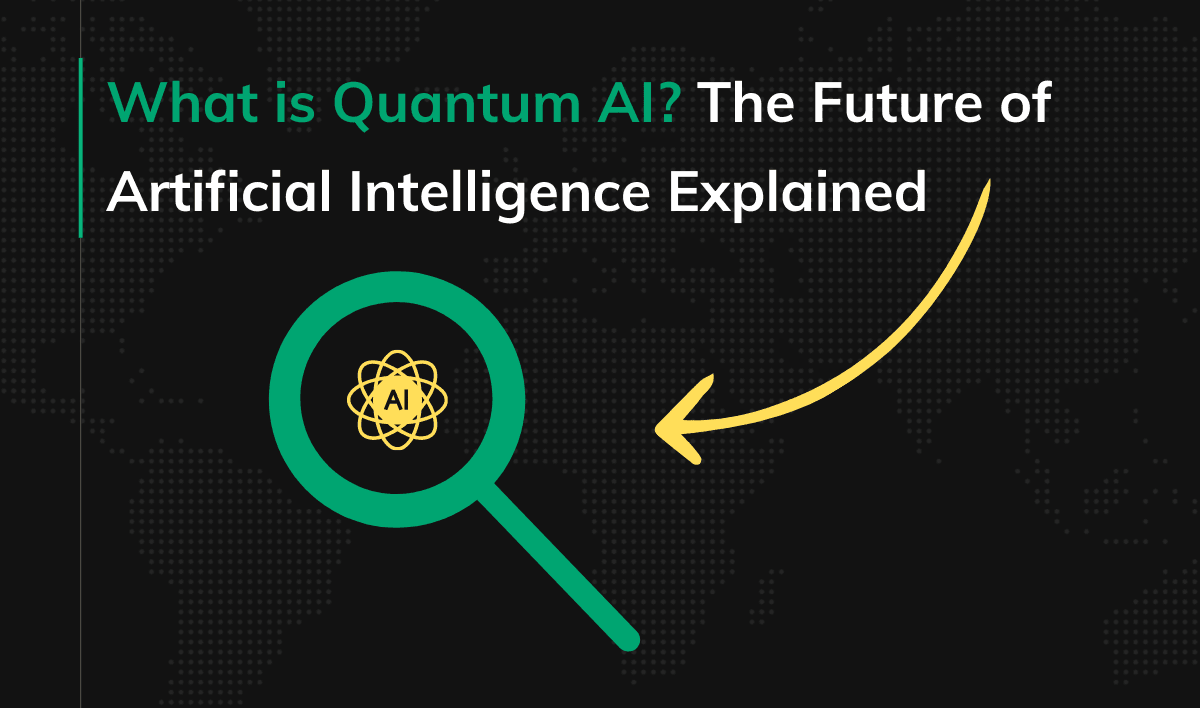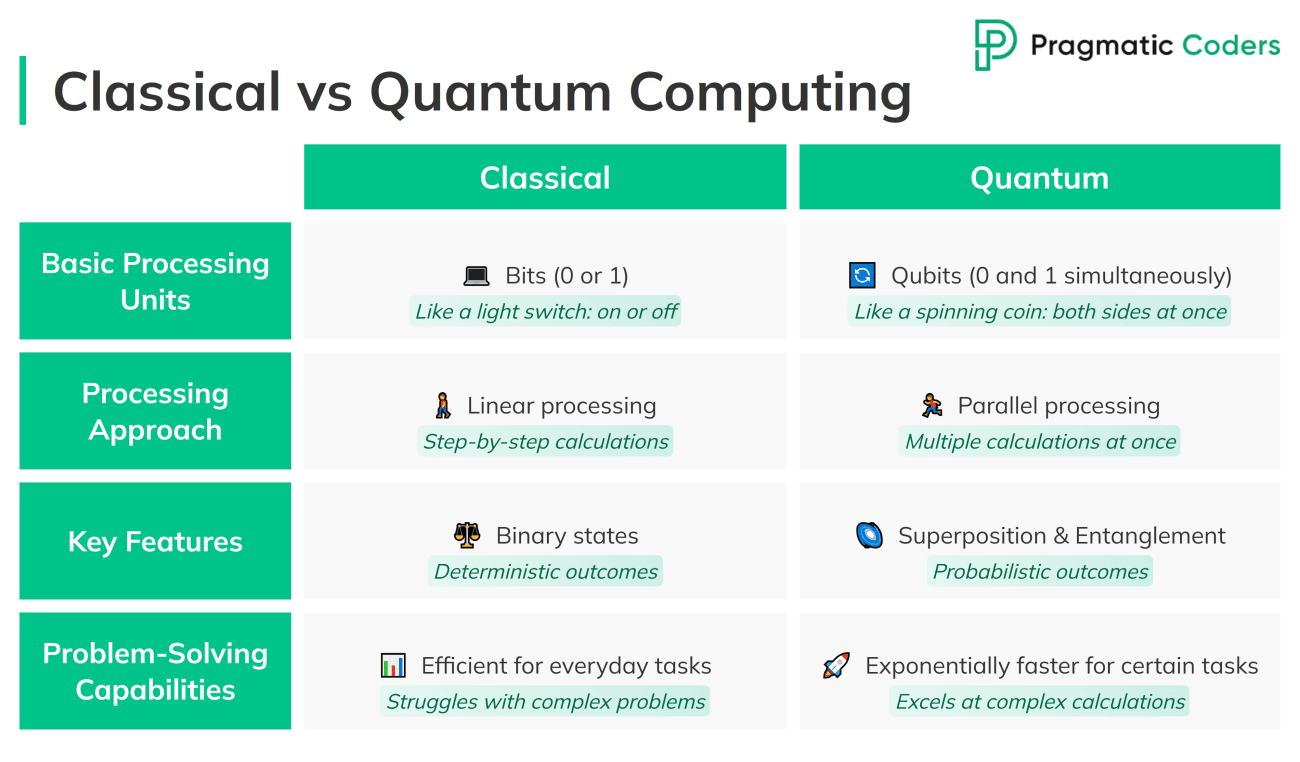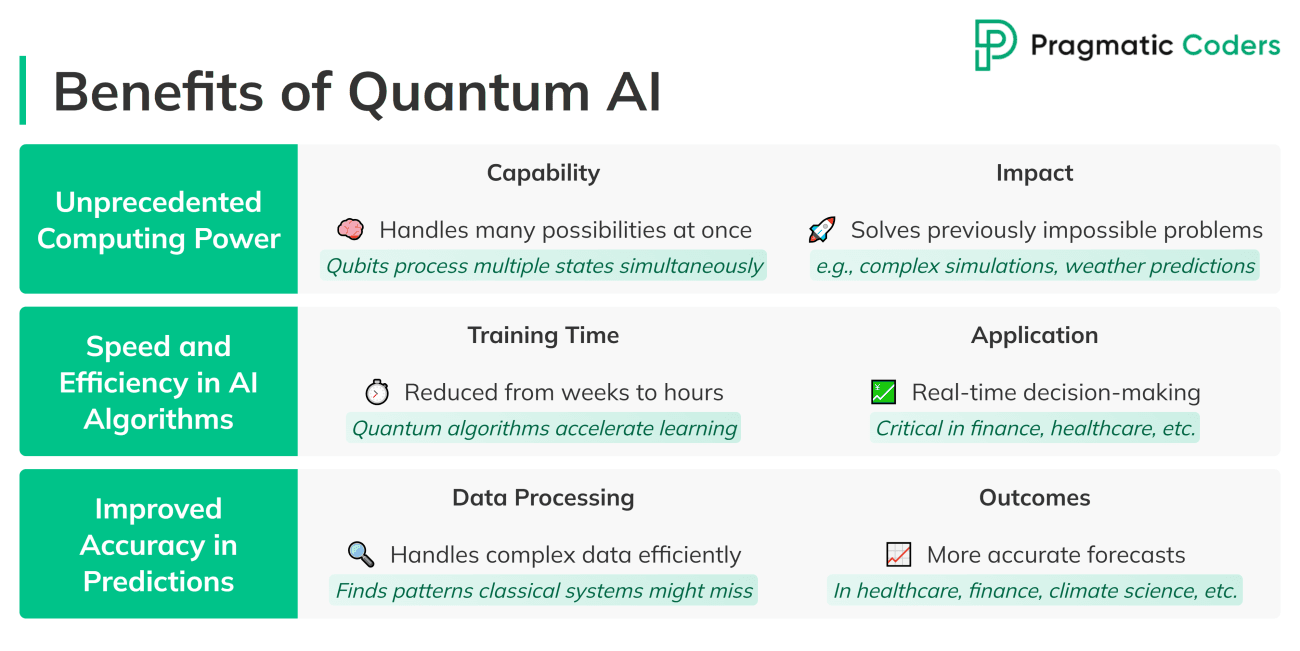What is Quantum AI? The Future of Artificial Intelligence Explained

Quantum AI (QAI) is where quantum computing meets artificial intelligence. It’s a powerful combination. AI already helps industries analyze data and make decisions. But quantum computing takes this further. Instead of handling data one bit at a time, quantum computers use qubits. And qubits can process complex information much faster than regular computers.
This means Quantum AI can solve tough problems in fields like finance, healthcare, and logistics. Think about AI accurately predicting market changes or helping discover completely new medicines—things we thought were out of reach.
And no, this technology isn’t just an upgrade. It’s a game-changer. It will shape the future of computing and revolutionize industries across the board. Probably.
Key Points
|
Understanding Quantum Computing and Artificial Intelligence
Classical Computing vs. Quantum Computing
To understand Quantum AI, let’s start with the basics of computing. Traditional computers, the ones we use every day, process data using bits. These bits can either be a 0 or a 1—nothing in between. It’s like flipping a light switch on or off. This type of computing works great for many tasks, but it has its limits, especially when it comes to solving really complex problems.
Quantum computers, on the other hand, use qubits. Unlike bits, qubits can be both 0 and 1 at the same time. This is thanks to a phenomenon in quantum mechanics called superposition. Think of it like a spinning coin—it’s not heads or tails until it lands. This allows quantum computers to process many possibilities at once, rather than going through one by one like traditional computers.
Another feature of quantum systems is entanglement. When qubits become entangled, they can be linked together in such a way that the state of one qubit directly affects the other, no matter how far apart they are. This creates a level of parallel processing that classical computers simply can’t achieve. While traditional computers process in a linear way—step by step—quantum computers can handle multiple calculations at once, making them exponentially faster for certain tasks.

The Role of AI in Modern Technologies
AI is already a huge part of our everyday lives, even if we don’t always notice it. It’s main strength is its ability to recognize patterns and make decisions based on massive amounts of data. Whether it’s a recommendation engine on your favorite streaming service, fraud detection in banking, or medical imaging analysis, AI is transforming industries by improving efficiency and accuracy.
In finance, for example, AI solutions help with everything from predicting market trends to managing risks. They can quickly sift through massive datasets, spotting patterns that would take humans much longer to detect. In healthcare, AI assists doctors by analyzing medical images and even predicting patient outcomes based on historical data.
What makes AI powerful is its ability to “learn” from data. Through machine learning, AI systems can improve over time, making more accurate predictions as they process more information. This adaptability is what makes AI a key tool in solving complex, real-world problems across different industries.
How Quantum AI Works
A Leap Beyond Classical AI
Quantum AI uses the speed and parallel processing of quantum computing to improve AI. Classical AI can analyze patterns and process data. But with superposition and entanglement, quantum AI can do this much faster. It can manage larger datasets and run more complex simulations. This opens the door to solving problems that traditional AI struggles with.
Quantum Neural Networks
Quantum neural networks (QNNs) are where quantum computing meets AI. Traditional neural networks try to mimic the human brain, learning from data and recognizing patterns. But they slow down with larger, more complex data sets.
With quantum neural networks, things change. They use the speed of quantum computing to learn much faster. For example, when analyzing images or financial trends, QNNs can spot patterns quicker and with greater accuracy.
This could mean faster, better diagnoses in healthcare or smarter investment predictions in finance. Quantum neural networks are still new, but they promise to push AI to levels we haven’t seen yet.
Real-World Applications of QAI
Quantum AI in the Automotive Industry
Quantum AI is making waves in the automotive world, with big players like Volkswagen, Mercedes-Benz, and BMW leading the charge. These companies are working with research centers to explore how quantum-enhanced AI can improve everything from quality control to self-driving cars.
One area of focus is using quantum machine learning for detecting defects in welding. Think of it like supercharged quality control—quantum algorithms analyze data to spot issues faster and (hopefully) more accurately. While the early results are promising, it’s still not clear whether quantum methods will actually beat the classical tools we use today.
Another exciting area is quantum reinforcement learning for self-driving cars. Imagine a system that can learn how to navigate busy streets without crashing. Researchers are testing these algorithms in simulations, and the results are encouraging. However, scaling this tech to real-world roads is still a big challenge, so we’re not there yet.
Quantum AI in Sustainable Energy
Quantum AI could also play a huge role in the shift to sustainable energy. Quantum computers have the potential to accelerate the discovery of new materials for energy storage, which could make solar panels and batteries more efficient.
Researchers are excited about how quantum simulations can help solve problems that classical computers struggle with, like designing more efficient materials for renewable energy systems. While it all sounds great, most of these ideas are still in the lab, and we might need a few more years before we see them in action.
QAI in IoT and Real-Time Decision-Making
The Internet of Things (IoT) is all about real-time data—whether it’s managing traffic in a busy city or keeping an eye on factory machines. Traditional AI can get overwhelmed by the sheer volume of data coming from IoT devices, but quantum AI could be the game-changer here.
For instance, Volkswagen is testing quantum AI to manage traffic flow in real-time using data from IoT sensors. By analyzing traffic patterns quickly, it could help reduce congestion and improve city mobility. Similarly, in factories, quantum AI could predict when machines are about to break down, so maintenance teams can act before things go wrong. While these projects are exciting, they’re still experimental and haven’t been widely adopted just yet.
The Benefits of Quantum Artificial Intelligence
Unprecedented Computing Power
Quantum AI brings computing power that traditional systems can’t match. Thanks to qubits, quantum computers handle many possibilities at once. In contrast, classical computers process one thing at a time (0 or 1). This gives quantum AI the ability to solve problems that were impossible before. For example, it can speed up complex simulations like weather predictions or chemical reactions. While we’re still early in its development, quantum AI could solve challenges we haven’t even imagined yet.
Speed and Efficiency in AI Algorithms
Training AI models can take weeks, depending on how complex they are. Quantum AI could change that by speeding up the process. With quantum algorithms, training could take just hours. This isn’t just about saving time. Faster model training means real-time decision-making in fields like healthcare or finance, where quick, accurate decisions matter. Imagine training a model to predict stock market trends or discover new drugs in a fraction of the current time.
Improved Accuracy in Predictions
Quantum AI also promises better accuracy. Classical AI systems are powerful but can struggle with very complex data. Quantum AI, on the other hand, can process large amounts of information at once, finding patterns that classical systems might miss. This could lead to more accurate forecasts, whether in healthcare, finance, or climate science. Early research suggests that quantum AI will outperform today’s systems in making predictions.

Challenges in Quantum AI Development
Technical Hurdles in Quantum Hardware
Quantum computers are still in their early stages. They can be unstable and prone to errors. This makes it hard to rely on them for long, complex calculations. Qubits are very sensitive to their environment. Even slight disturbances can cause them to lose their state, leading to errors in calculations. Building hardware that’s stable and scalable is a big challenge. As of now, quantum computers can only handle small tasks, and we are far from having systems that can perform at scale.
Algorithm Development for Quantum AI
Creating algorithms that truly take advantage of quantum computing is another challenge. Quantum computers work in ways that are very different from classical computers, so the algorithms need to be built from the ground up. Researchers are still figuring out how to design algorithms that fully unlock the power of quantum AI. While there have been breakthroughs, many algorithms are still experimental, and it’s unclear when they will be ready for real-world applications. The gap between theory and practical implementation remains wide.
The Future of Quantum AI
Overcoming the Challenges
Scientists are actively working on solutions to fix quantum computing’s limitations. There are advancements in reducing errors and making qubits more stable. New research in error-correcting codes and better hardware design is helping. It will take time, but many believe these improvements will make quantum computers more reliable. Ongoing research and development will likely solve today’s challenges.
Quantum AI’s Potential Impact Across Industries
Quantum AI has the potential to reshape many industries. In healthcare, it could speed up drug discovery by processing huge amounts of data quickly. In logistics, it could optimize supply chains, making them faster and more efficient. It may even help in climate research by running simulations faster than we can today. Moreover, its advanced computational capabilities might eventually enable it to automate complex coding tasks and potentially replace programmers—an achievement that regular AI is unlikely to gain. As this technology advances, industries like these could see massive improvements in their processes.
Conclusion
Quantum AI holds incredible promise. By merging the speed of quantum computing with the learning power of AI, it creates new possibilities. Together, they have the potential to solve problems once thought impossible. While many challenges remain—such as hardware limitations and algorithm development—ongoing research continues to push the field forward. Quantum AI could soon reshape industries like automotive, energy, IoT, healthcare, finance, and logistics, driving unprecedented advancements in technology and innovation. It may well be the next major leap in computing, transforming how we solve the world’s toughest problems.







